A pro-Palestinian demonstration that paralysed Columbia University ended in dramatic fashion on Tuesday night, with riot police bursting into a building occupied by demonstrators and making hundreds of arrests.
Meanwhile, on the other side of the country, clashes broke out between rival groups at the University of California, Los Angeles (UCLA) early on Wednesday,
New York City officers entered Columbia’s campus late on Tuesday after the university requested help, according to a statement.
Manhattan District Attorney Alvin Bragg said about 170 of the 280 arrested at Columbia University and City College have received summonses.
A tent encampment in Columbia’s grounds was cleared, along with Hamilton Hall, where a stream of officers used a ladder to climb through a second-floor window.
Protesters calling on the Ivy League university to stop doing business with Israel or companies that support the war in Gaza had seized the hall about 20 hours earlier.
“After the university learned overnight that Hamilton Hall had been occupied, vandalised, and blockaded, we were left with no choice,” the statement said.
“The decision to reach out to the NYPD was in response to the actions of the protesters, not the cause they are championing. We have made it clear that the life of campus cannot be endlessly interrupted by protesters who violate the rules and the law.”
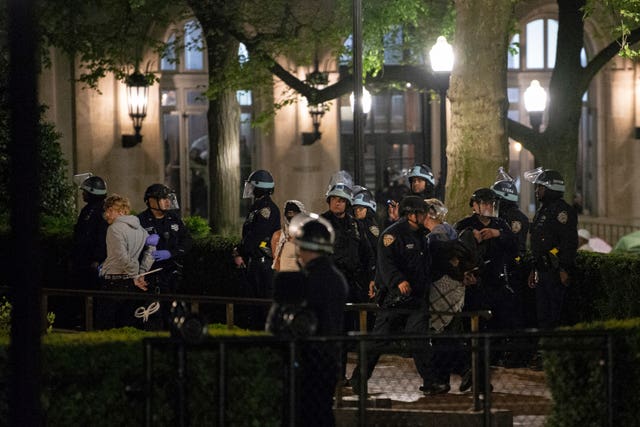
The arrests occurred after protesters ignored an earlier ultimatum to abandon the encampment on Monday or be suspended, and unfolded as other universities stepped up efforts to end demonstrations that were inspired by Columbia.
Fabien Lugo, a first-year accounting student who said he was not involved in the protests, said he opposed the university’s decision to call in police.
“This is too intense,” he said. “It feels like more of an escalation than a de-escalation.”
Meanwhile, violence broke out at UCLA overnight between pro-Palestinian and pro-Israeli protesters, and police in riot gear arrived but did not immediately intervene.
Before the riot police arrived, a group piled on one person who lay on the ground, kicking and beating them until others pulled them out of the scrum.
Mary Osako, a senior UCLA official, told campus newspaper the Daily Bruin: “Horrific acts of violence occurred at the encampment tonight and we immediately called law enforcement for mutual aid support.”
Los Angeles Mayor Karen Bass spoke to the university’s chancellor and said police would respond to the school’s request, according to a post on social media platform X, formerly Twitter, from her spokesman, Zach Seidl.
The clashes took place just outside a tent encampment, where pro-Palestinian protesters erected barricades and plywood for protection – and counter-protesters tried to pull them down.
Security was tightened at the campus on Tuesday after officials said there were “physical altercations” between factions of protesters.
Lectures were cancelled on Wednesday at UCLA.
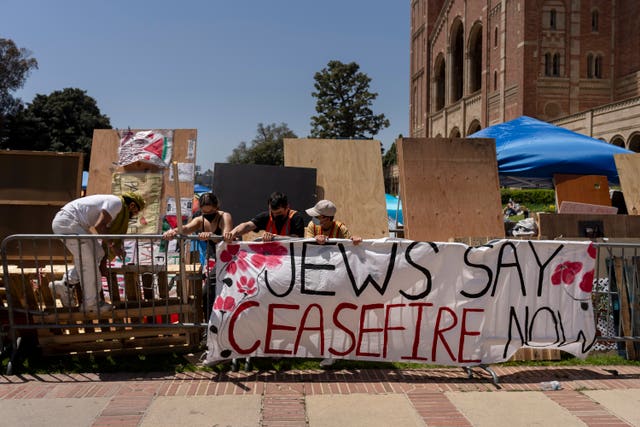
In rarer instances, university officials and protest leaders have struck agreements to limit the disruption to campus life and forthcoming commencement ceremonies.
Just blocks away from Columbia, at The City College of New York, demonstrators were in a stand-off with police outside the public college’s main gate.
Video posted on social media by news reporters on the scene late on Tuesday showed officers putting some people to the ground and shoving others as they cleared people from the street and pavements. Many detained protesters were driven away on city buses.
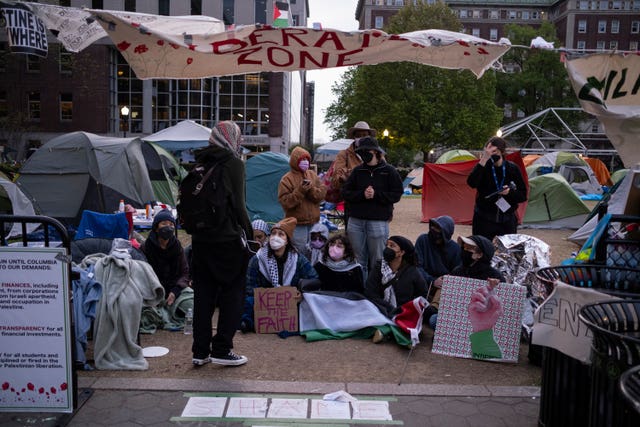
Brown University, another member of the Ivy League, reached an agreement with protesters on its Rhode Island campus on Tuesday.
Demonstrators said they would close their encampment in exchange for administrators taking a vote to consider divestment from Israel in October. The compromise appeared to mark the first time a US college has agreed to vote on divestment in the wake of the protests.
Columbia’s police action happened on the 56th anniversary of a similar move to quash an occupation of Hamilton Hall by students protesting racism and the Vietnam War.
Earlier on Tuesday, the police department said officers would not enter the grounds unless at the college administration’s request or for an imminent emergency. Now, law enforcement will be there until May 17, the end of the university’s commencement events.
In a letter to senior NYPD officials, Columbia President Minouche Shafik said the administration made the request that police remove protesters from the occupied building and a nearby tent encampment “with the utmost regret”.
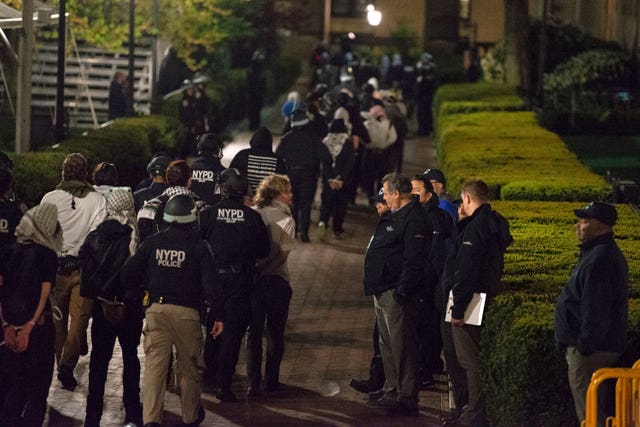
Neither provided specific evidence to back up that contention, which was disputed by protest organisers and participants.
NYPD officials made similar claims about “outside agitators” during the huge, grassroots demonstrations against racial injustice that erupted across the city after the death of George Floyd in 2020.
In some instances, top police officials falsely labelled peaceful marches organised by well-known neighbourhood activists as the work of violent extremists.
Before officers arrived at Columbia, the White House condemned the stand-offs there and at California State Polytechnic University, Humboldt, where protesters had occupied two buildings for more than a week until officers with batons intervened early on Tuesday and arrested 25 people.
President Joe Biden believes students occupying an academic building is “absolutely the wrong approach”, said National Security Council spokesman John Kirby.
Later, former president Donald Trump phoned in to Sean Hannity’s show on Fox News Channel to comment on Columbia’s turmoil as live footage of police clearing Hamilton Hall aired.
Mr Trump praised the officers, “but it should never have gotten to this”, he said.
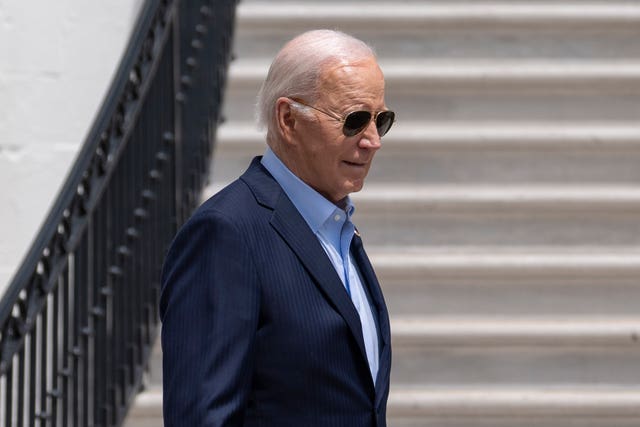
Militants killed about 1,200 people, most of them civilians, and took roughly 250 hostages.
Vowing to stamp out Hamas, Israel has killed more than 34,000 Palestinians in the Gaza Strip, according to the local health ministry.
As ceasefire negotiations appeared to gain steam, it was not clear whether those talks would inspire an easing of protests.
Israel and its supporters have branded the university protests antisemitic, while Israel’s critics say it uses those allegations to silence opposition.
Although some protesters have been caught on camera making antisemitic remarks or violent threats, organisers of the protests, some of whom are Jewish, say it is a peaceful movement aimed at defending Palestinian rights and protesting over the war.
On Columbia’s campus, protesters first set up a tent encampment almost two weeks ago. The school sent in police to clear the tents the following day, arresting more than 100 people, only for the students to return.
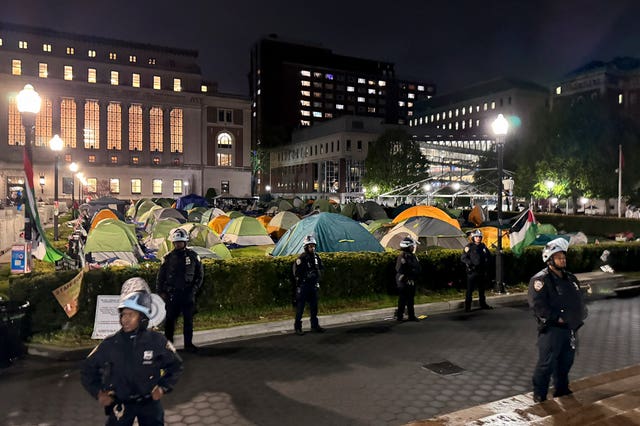
Instead, protesters defied the ultimatum and took over Hamilton Hall early on Tuesday, carrying in furniture and metal barricades.
A small group of Palestinians demonstrated on Wednesday in central Gaza in solidarity with the pro-Palestinian protests taking place in the US.
At a camp for displaced people in the city of Deir al-Balah, signs read: “Thanks for your solidarity! THE OHIO STATE UNIVERSITY”. Other posters thanked several other American universities where pro-Palestinian demonstrations have been taking place, including Harvard, MIT, Northwestern and George Washington universities.
Four officers were injured on Wednesday as police tried to remove protesters’ tents from a central square at the University of Wisconsin in Madison, Wisconsin.
A campus police spokesman said a state trooper was hit in the head with a skateboard and three sheriff’s deputies suffered injuries “directly related to the physical resistance from protesters”.
At least a dozen people were arrested. Police removed all but one tent while clashing with the demonstrators. But scores of protesters resumed chanting and, a few hours later, had erected more tents on the square.






